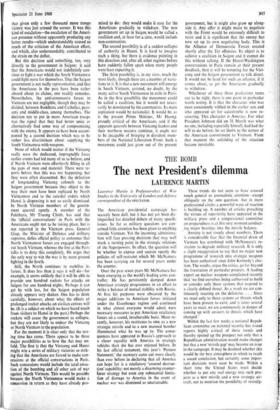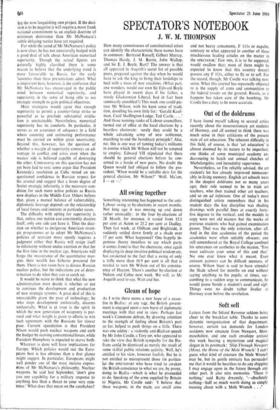The next President's dilemma
THE BOMB
LAURENCE MARTIN Laurence Martin is Professor-elect of War Studies in the University of London and defence correspondent of the SPECTATOR.
The American presidential campaign has scarcely been dull, but it has not yet been dis- tinguished for detailed debate of many specific issues. So far as military questions are con- ce1•ned little attention has been given to anything outside Vietnam. Yet the incoming administra- tion will face pressing decisions that may well mark a turning point in the strategic relations of the Superpowers. In effect, the question will be whether to expose and sustain openly the policies of self-restraint which Mr McNamara has been carrying on for several years under the counter.
Over the past seven years Mr McNamara has been emerging as the world's leading arms con- troller. He has persistently damped down American strategic programmes in an effort to strike a balance of mutual stability with Russia. At first his purposes were obscured by the major additions to American forces initiated under the Eisenhower regime and continued in what almost everyone would admit were necessary measures to put American retaliatory forces on a sound, invulnerable basis. More re- cently, however, his resistance to ABM, to a new strategic missile and to a new manned bomber illuminated what he was up to. The conse- quences have appeared in Russia's approach to a closer equality with America in strategic vehicles than she has ever enjoyed before. In his last official testament, this year's 'Posture Statement,' the secretary came out more clearly than ever before in declaring that all America can hope for is a retaliatory 'assured destruc- tion' capability; not merely a disarming counter- force strategy but even any substantial limita- tion of damage to America in the event of nuclear war was dismissed as unattainable.
These trends do not seem to have aroused much general or journalistic attention—except obliquely on the ABM question—but in more professional circles a powerful wave of reaction is building up. A number of articles preaching the virtues of superiority have appeared in the military press and a congressional committee on preparedness is at this very moment conduct- ing major hearings into the missile balance.
Anxiety is not simply about numbers. There is considerable fear that the financial drain of Vietnam has combined with McNamara's re- straints to degrade military research. It is only a slight exaggeration to say that no major new programme of research into strategic weapons has been authorised since John Kennedy's elec- tion. The results, argue the critics, go far beyond the frustration of particular projects. A leading expert on nuclear weapons complained recently that 'we find ourselves being authorised to build or consider only those systems that respond to a clearly defined threat. As a result we are con- tinuously reacting on the defensive. . . . Since we react only to those systems or threats which have been proven to exist, and it takes several years to react, we are continuously in danger of coming up with answers to threats which have changed.'
Within the last few weeks a national Repub- lican committee on national security has issued reports highly critical of these trends and thereby opened up the prospect not only that a Republican administration would make changes but that a new 'missile gap' may become an issue in the campaign. It may be doubted whether this would be the best atmosphere in which to reach a sound conclusion, but certainly some impor- tant decisions must soon be made. Within a short time the United States must decide whether to put any real energy intd such pro- jects as a new missile and a new strategic air- craft, not to mention the possibility of revivify.
iog the now languishing ABM project. If the deci- sion is to be negative it will require a more frank national commitment to an explicit doctrine of minimum deterrence than Mr McNamara's subtle delaying tactics have yet required.
For while the trend of Mr McNamara's policy is now clear, he has not unnaturally hedged with a good deal of talk about American numerical superiority. Though the actual figures are naturally highly classified there is some reason to believe that the underlying trend is more favourable to Russia for the early 'seventies than these presentations admit. What is important here, however, is the confusion that Mr McNamara has encouraged in the public mind between numerical superiority, and superiority in the sense of being able to use strategic strength to gain political objectives.
Most strategists would agree that enough superiority to permit a counter-force strike so powerful as to preclude substantial retalia- tion is unattainable. Nevertheless, numerical superiority has its comforts. In particular, it serves as an assurance of adequacy in a field where counting and estimating performance must be carried on within great uncertainty. Beyond this, however, lies the question of whether a margin of superiority conveys an ad- vantage in conflict and crisis even when the weaker side is believed capable of destroying the other. Controversy on this question has not yet been laid to rest; some argue that President Kennedy's resolution at Cuba rested on un- questioned confidence in Russian respect for his arsenal and suggest that a lesser degree of Soviet strategic inferiority is the necessary con- dition for such more active policies as Russia now displays in the Middle East. Others believe that, given a mutual balance of vulnerability, diplomatic leverage depends on the relationship of local forces and interests in particular cases.
The difficulty with opting for superiority is that, unless one nation can consistently deceive itself, only one side can have it. Thus the deci- sion on whether to invigorate American strate- gic programmes or to adopt Mr McNamara's policies of restraint more openly requires a judgment either that Russia will resign itself to inferiority without undue exertion or that for the first time in the nuclear age, Americans will forgo the reassurance of the quantitative mar- gins their wealth has hitherto procured for them. There is not room here to discuss Russian nuclear policy, but the indications are of deter- mination to do what they can to catch up.
It would be naive to think that what the new administration must decide is whether or not to continue the development and production of new strategic systems. A great deal of this is unavoidable given the pace of technology; he who stops development unilaterally, disarms unilaterally. What is at issue is the spirit in which the new generation of weaponry is pur- sued and what weight is given to efforts to win -tacit agreement with the Russians for slower pace. Current speculation is that President Nixon would push nuclear weapons and curb the budget by starving conventional forces, while President Humphrey is expected to starve both.
Whatever is done will have implications for Europe. Which policies would suit the Euro- Nans best is less obvious than a first glance might suggest. In particular, Europeans might well ponder one of the most incisive expres- sions of Mr McNamara% philosophy. Nuclear weapons, he said last September, 'don't give you any capability for a military response to anything less than a threat to your very exis- tence.' What does that mean on the autobahns?







































 Previous page
Previous page